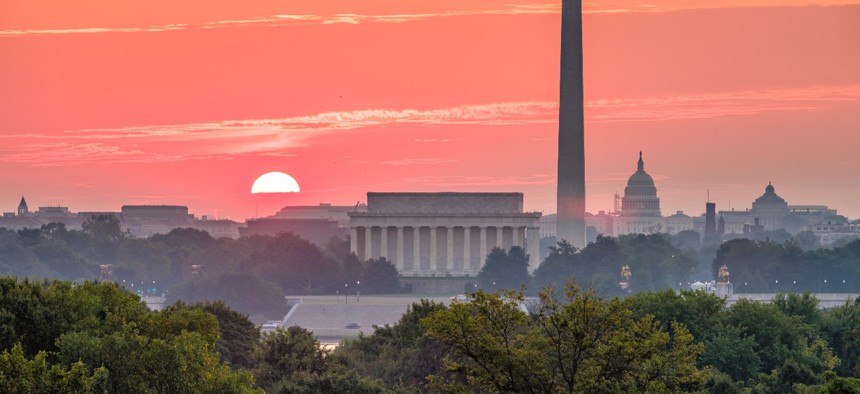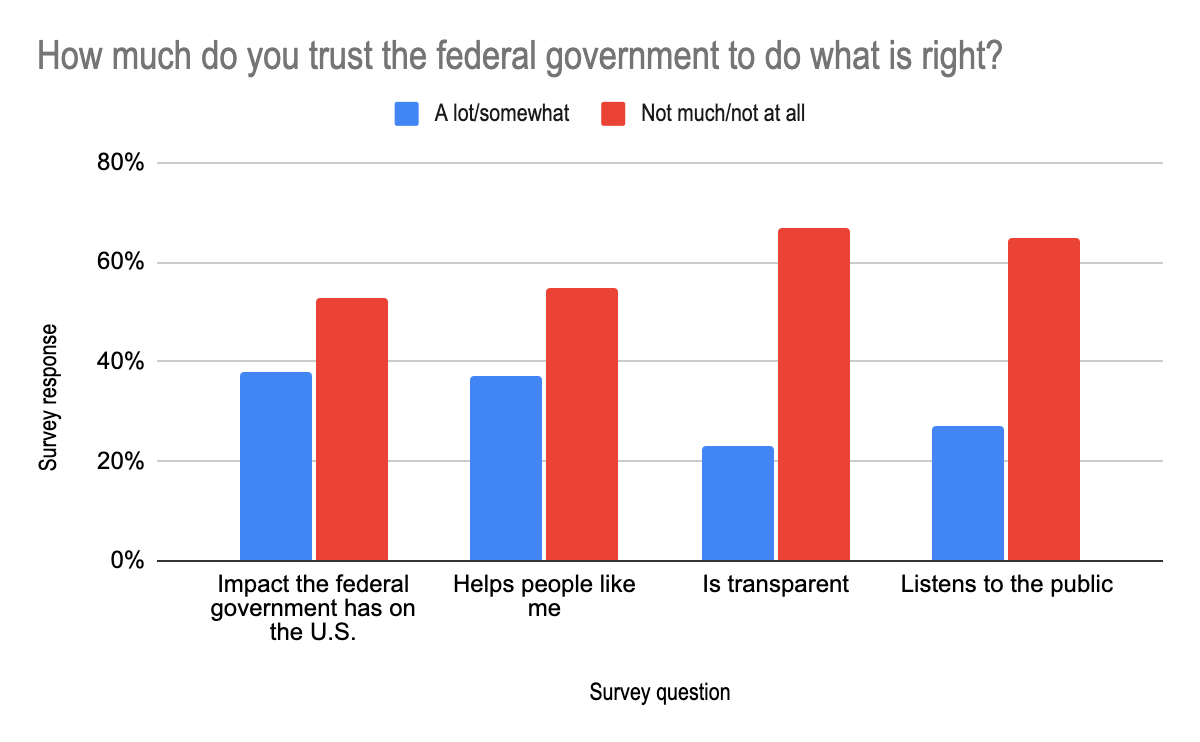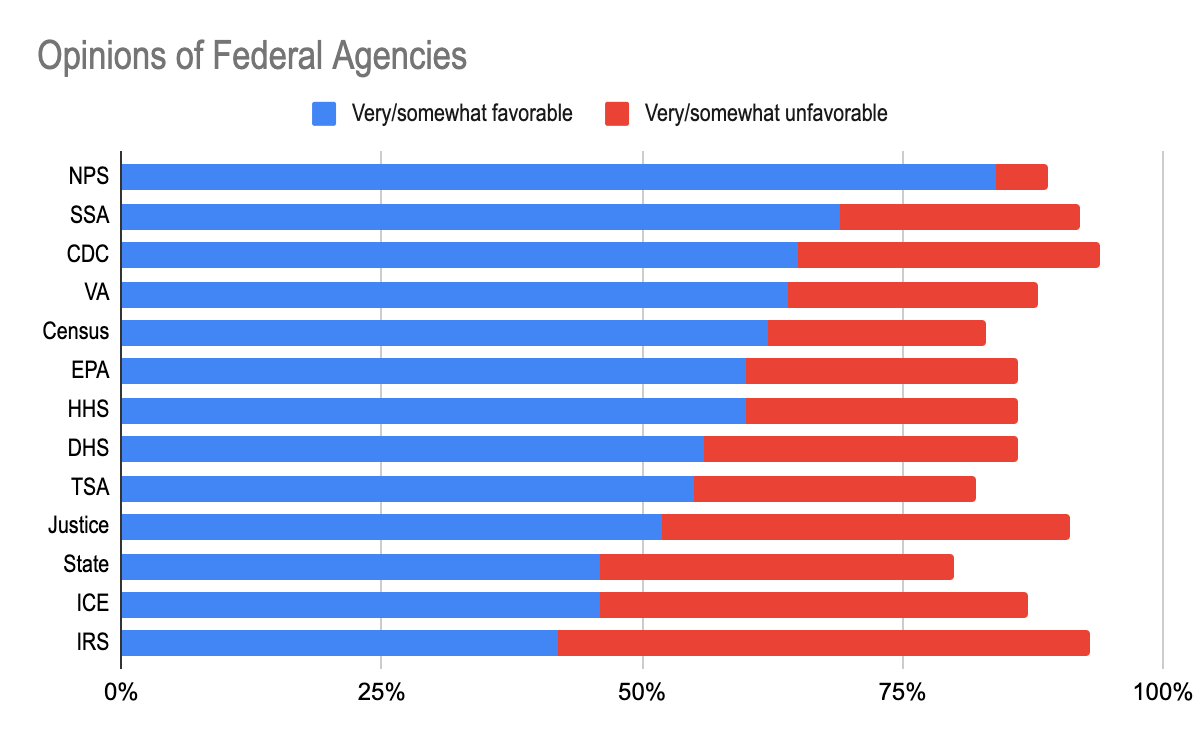
John Baggaley / Getty Images
Trust in the Federal Government is Low, But Views of Feds Are Mostly Positive
A recent survey brought many high marks for federal employees and individual agencies.
Only four in 10 people trust the federal government to do what’s right, according to a new survey, but Americans have a more favorable view when asked specifically about the people and institutions that make up the bureaucracy.
Low trust in the federal government is nothing new as previous studies from Gallup and the Pew Research Center have shown. But a report released on Tuesday by the nonprofit Partnership for Public Service and Freedman Consulting seeks to focus less on the “Washington” sentiment and more on the agencies and people inside the federal government, drawing its conclusions from a survey, focus groups and online discussion panels. This comes as the Biden administration is working to implement the president’s executive order on improving agencies’ customer service and the president’s management agenda, both of which mention specifically rebuilding the public’s trust in the government.
“Restoring trust in the federal government, the one institution with the ability to deal with our nation’s most critical social, economic and foreign policy challenges, is essential to the health of our democracy,” said Max Stier, president and CEO of the Partnership. “Our aim is to understand why people distrust the federal government, what can be done to improve trust and how to better communicate our government’s successes.” This is the first in a series of upcoming reports from the Partnership on this issue.
Overall, the survey of 2,301 adults nationwide conducted in October found that 40% of respondents said they trusted the federal government to do what’s right “a lot” or “somewhat” while 56% said they didn’t trust the government much or at all. Further results are shown in the chart below:

There were higher rates of trust among Democrats (60%) compared to Republicans (27%) and independents (26%). The Pew Research Center has found since the 1970s trust in the government has been higher among individuals whose political party controls the White House; however, Republicans tend to be “more reactive” to changes in leadership than Democrats have been, the report noted.
The results also showed higher levels of education correlated with more trust in the government. Gender overall and age were not significant factors in trust levels, but there was variation among racial demographics. About half of Black respondents as well as Asian American/Pacific Islanders reported they trusted the government “a lot” or “somewhat,” in comparison to 39% of Hispanics and 38% of white respondents.
Reasons for the Distrust
Some of the major reasons for distrust were: people not believing the government serves their communities as well as it does others; the governing being “too bureaucratic” and “wasteful;” and negative personal experiences with the government.
“About two-thirds of the respondents who said most of their personal experiences with the federal government were positive also said they trusted the government (64%),” said a report on the results. “By contrast, for those who said that their experiences with the federal government had not been positive, only 14% said they trusted the government while 85% reported they did not.”
One focus group participant shared a common sentiment, which was: “I don't fully trust [the government] ... But there have been interactions I've had, and people that I know have had, [where problems were] solved. They've gotten taken care of.”
Views on Civil Servants
Views of the 2 million civil servants who make up the federal workforce––85% of whom live outside the Washington, D.C. area––were “complex,” but positive overall, said the Partnership.
Fifty-seven percent of respondents said they believed federal employees are doing public service and 56% said they are hard workers. Also, more than half of respondents believe they are as competent as private sector employees and work just as hard as them and are competent. “At the same time, about half of the respondents agreed with the view that federal employees are “more interested in helping themselves than the public,” said the report. “About the same number said federal government employees make more money than the average private sector employee doing similar jobs—a statement that is not always accurate.”
One interviewee said, “I think people start [in the federal government] with the intentions of doing good. But after a while they become drunk with the power and the money.”
Another said, “[People work in the government] to better our nation, help their fellow citizens, and to feel a sense of accomplishment as they do genuine good in the world. Heaven knows it's not for a paycheck.”
Respondents were not asked specifically if they trusted federal employees.
Views on Certain Federal Agencies
Participants were also asked about their feelings on 13 well-known agencies, 12 of which were viewed as more favorable than unfavorable, the one exception being the Internal Revenue Service.

“These findings suggest that the public does not distrust or dislike all of the government,” said the report. “Only certain parts are unpopular, but these elements drive the conception of the government as a whole.”
Similarly, the American Customer Satisfaction Index said in a report released in January that customer satisfaction with the government dropped to an all-time low in 2021 (with a score of 63 on a 100 point scale) but the Interior Department, which houses the National Park Service, scored a 77 and several others ranked above the federal government.
Implications of Distrust in the Government
One of the pitfalls of distrust in the federal government could be it provides a disincentive for young people to want to enter the civil service, which comes as only approximately 7% of the workforce is under 30 and about one in three federal employees will be retirement eligible in the next five years, said the Partnership.
There are also public health implications as 46% of the people who said they were vaccinated against the coronavirus trusted the government, in comparison to 29% of people who were not.
Going a step further, the report cited a recent study published in the medical journal The Lancet that found countries with higher levels of trust in the government, had lower COVID-19 infection and fatality rates from Jan 1, 2020, to Sept 30, 2021.
The Partnership, Freedman Consulting and Impact Research conducted their survey from Oct. 18–24, 2021 with “oversamples” of individuals who self-identified as Black or African American, Asian American or Pacific Islander, and Hispanic or Latino. Responses were weighted in order to reflect the country’s demographics. The margin of error was +/- 2.2 percentage points. For the survey, respondents had the ability to select “I don’t know” for the questions, so that could account for some of the responses that don’t add up to 100% with the margin of error.
Additionally, focus groups and online discussion panels conducted with Echelon Insights in August and September of 2021 provided qualitative responses.







